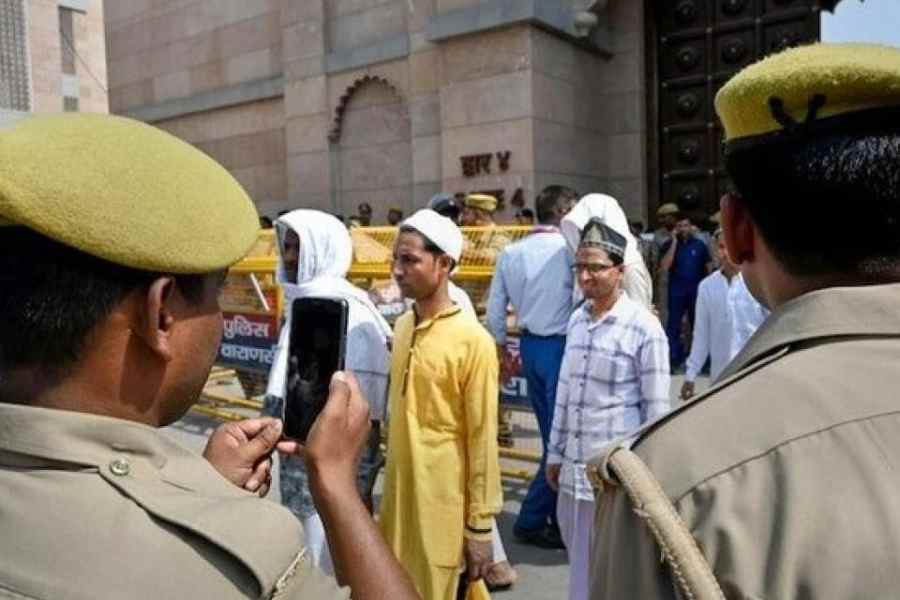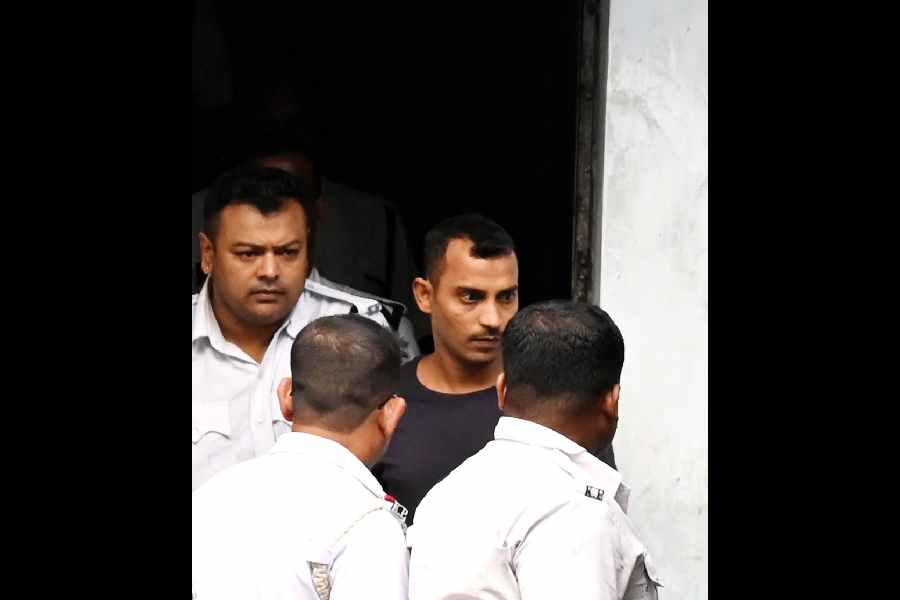The following are excerpts from conversations with several Muslims and Hindus employed in a Muslim-owned establishment in Kerala, one of the handful of states where the minorities feel relatively safe, in December, soon after the results of the elections to the assemblies in five states were declared and over a month before the January 22 event in Ayodhya unfolded. The interviewees were offered the choice to remain anonymous so that they can speak freely.
Muslim employee in a company run by Muslims and supported by an Islamic organisation: I had heard that it is difficult for Muslims to get homes on rent in places like Mumbai. But these days, some of my friends tell me that it is not much different in some places in Kerala either. I don’t think it is limited to neighbourhoods where the sangh parivar is considered influential. I live in a Christian-dominated area. There too, I have heard of such complaints. I am not saying that people are being communal. But the mindset has changed in the past four or five years. (The Kerala where the columnist was born and brought up in the 1970s and 1980s was very different. Although some areas were known for residents of a particular religion, most neighbourhoods had a generous mix of all communities.) I think one of the reasons could be the negative impact of the stuff you read on social media. I feel that an impression has been created through the spread of such information that Muslims mean trouble.
Another Muslim employee: I have not come across any explicit instance that suggested that my religion is being held against me. Kerala is still a secular state. But I do feel an implicit change in my old neighbourhood. It is too subtle to describe it as hate or communal. Now I think twice before walking into a Hindu home in the old neighbourhood which is predominantly Hindu.
Third Muslim employee: I fear that a Muslim can be subjected to surveillance at the will of the State and that a Muslim could be jailed anytime. Or, at least such a feeling exists. And we do have some examples from here and there.
Hindu employee in the same organisation: Since I am not a Muslim, I don’t share the same fear. Neither do I think that I will be brought under surveillance because I work for a Muslim-owned firm.
But let me share an instance with you. On the anniversary of the demolition of the Babri Masjid, I had made a post on social media on how extremist Hindutva elements had destroyed the mosque. A junior in college — a Muslim who is a teacher now — posted a comment in which she said she also wanted to upload a similar message but she could not do so in the current atmosphere. She said she could have done so earlier. But now her studies are over, she has found a job and moved up the social structure, following which she felt compelled to establish that she is ‘more secular’ than others. It was as if the onus of upholding secularism rested solely on her. I got the feeling that she did not feel free to condemn outright the terrorist act that the demolition was.
Another Muslim employee: Earlier, we used to be very active in temple festivals. We would help out in any manner that we could, except taking part in religious rituals. Now, that has changed. Neither are we welcome nor are many Muslims willing to lend a helping hand. Most temple committees have been taken over by the RSS or people sympathetic to the sangh. In some places, boards have been put up, saying “non-Hindus not allowed”. In my locality, we used to help organise the annual festivals in at least five temples. Now, we don’t go to a single one.
Several Muslims working in cities or abroad used to time their holidays with the temple festivals. It was such a joyous occasion and the mood was infectious. Now, we can’t even think of such an atmosphere.
Another Muslim employee: This is true of Christian church festivals also. My brother was among those who used to help carry the Church float during the procession. He is no longer a part of that.
(Such interfaith cooperation used to be the norm earlier.)
Hindu employee: I am from Malappuram (Kerala’s lone Muslim-majority district, which was maligned by a BJP leader in 2020). A friend from Kozhikode and I had gone to Karnataka and wanted to check in at a homestay. The owner asked where we were from. When I said I was from Malappuram, he said he can’t let us stay there even before he found out my Hindu name. My district was the problem, not my religion, and my friend’s religion was the problem, not his district!
Hindu woman employee: I am often asked why I work for a ‘Muslim management’. I retort: “Why, aren’t Muslims human beings?” (This question — ‘Why do you work for a Muslim management?’ — is rarely asked when Malayalis go to the Gulf in search of employment.)
Some try to poke fun at me, even those who grew up with me, played with me when we were children. I can’t and I won’t turn my back on my Muslim friends. My neighbours are Muslim. When I am not there, they are the ones who help my parents.
When I was a child, all of us used to hang around beneath a banyan tree, exchanging stories and pulling each other’s legs. These days, a lamp and a saffron flag have been placed below most banyan trees, making them out of bounds for non-Hindus. I feel sad but I don’t say anything because I do not want to create strife.
Another Muslim employee: There’s another side too. Once a Hindu friend did an illustration of a Gulf-bound barge and it so happened that the flag at the mast was painted in orange. A Muslim called with a complaint: the Hindu artist deliberately sneaked in the ‘saffron’ colour. I know for a fact that it is not correct. It was just a coincidence. Conspiracy theorists are there everywhere.
Hindu woman employee: I studied in a nursery school run by an elderly Muslim gentleman associated with the local mosque. Most of the children in the locality studied there. But now such schools are rare. Muslims study in Muslim-run schools, Hindus in Hindu-managed schools and Christians in Church-run schools. The only exceptions are some Christian schools where all communities send children (probably in the belief that English education is better there, another person said later).
Senior Muslim employee: Talking about not knowing about one another, let me recount an experience from my childhood. The first encounter of our neighbourhood with Hindus from southern Kerala was when North Kerala schools started hiring teachers from the other end. I was told that one teacher reached our neighbourhood after dusk and saw the ‘Malappuram kathi (knife)’ at the waist of some men. She was terrified because of the stories she had heard about the wounds the knife can inflict. Actually, the knife was used to slice areca nut and chicken.
Soon the teacher got to know the people well — so much so that she took my uncle, who was a teenager then, with her to spend the vacation at her home in Kollam in South Kerala. Her family was so eager to make my uncle feel at home that they arranged for him to be taken all the way to Thiruvananthapuram, over 60 km away, so that he could offer namaz on Fridays at the famous mosque in Palayam! Any mosque nearby would have done but the family thought that as hosts, it was their responsibility to take him to the most famous mosque in the region.
That is the big difference. Not everyone knew everything. But most people respected what they did not know. That was a great virtue: respecting the unknown, especially when it came to sensitive matters like faith. It is the respect, not the knowledge or lack of it, that made the difference.
Muslim executive: I don’t think everyone changes their opinion on the basis of their personal experience alone. They are often influenced by external factors. When I was a child, our neighbour was a Hindu teacher. She was very close to our family. She used to buy toddy (which has alcohol content) once a year to make a condiment during a Hindu festival. The toddy would be kept at our house, about which my mother had no problem because she knew it was for a religious festival that the teacher celebrated. The teacher would share the condiment with us but when she offered a piece to my mother, who was religious, she would say: “Umma, I have not added toddy to this one.”
Yet, years later when I was finishing my higher studies, I had gone to her new home. I had grown a beard by then. The same teacher asked me: “Are you becoming a terrorist?” Of course, she was not being communal. But somehow she thought that it was okay to ask such a question.
In 2015, I met the teacher’s daughter. She introduced me to her daughter and told her: “Your generation does not have the chance to mingle with Muslims as we had. That’s why you have so many misgivings about Muslims. You must always remember that this neighbour and his siblings stood in for the brothers that I never had.”
I recounted this to illustrate that the teacher’s family is truly secular. Yet, the teacher asked me that question, probably reflecting how the times have changed.
*******
It is pertinent to repeat that the accounts above are from residents of Kerala, considered a relatively safe zone for the minority communities.
In the run-up to the January 22 event in Ayodhya, a Muslim who lives in Uttar Pradesh but not too far from Delhi messaged me: “To be a Muslim today is to watch the hourglass. Each grain that slips down is a testimony to a fresh instance of cruelty. One watches not knowing which one has my name on it.”
R. Rajagopal is editor-at-large, The Telegraph











